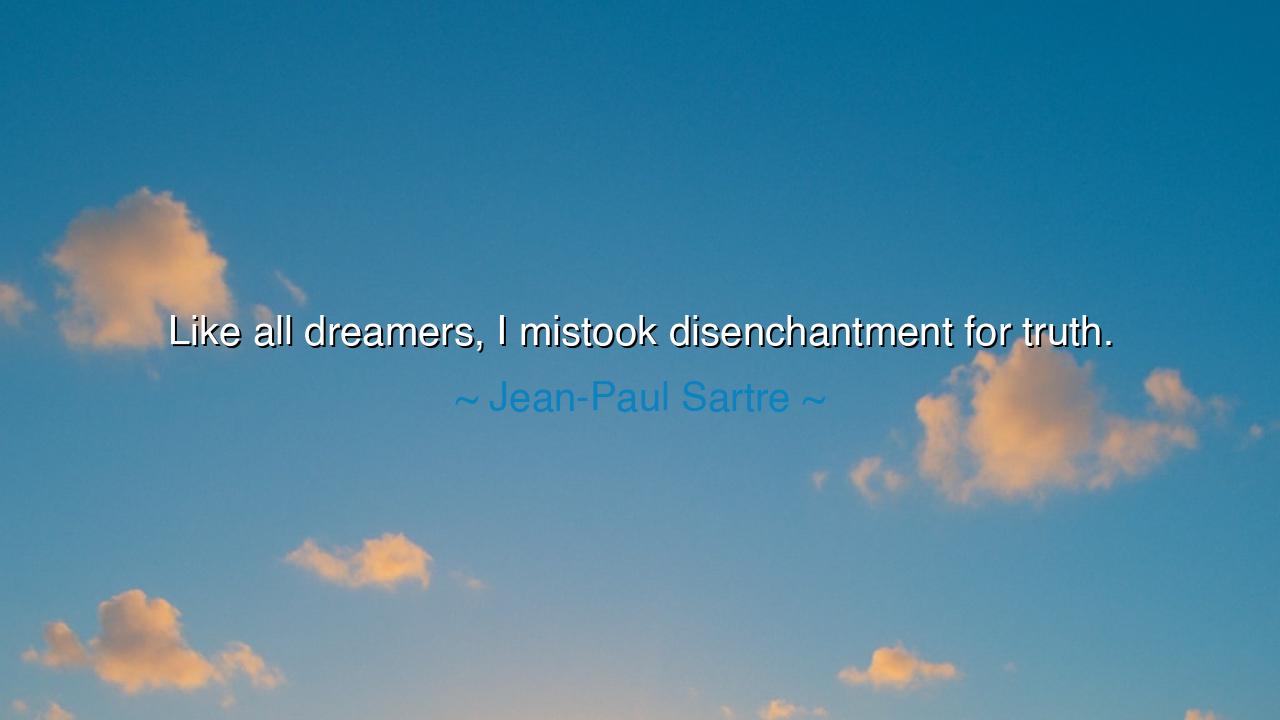
Like all dreamers, I mistook disenchantment for truth.






“Like all dreamers, I mistook disenchantment for truth.” Thus spoke Jean-Paul Sartre, the philosopher who gazed into the abyss of human freedom and saw both its glory and its despair. In this single line, he revealed a wound that many souls of vision have carried: the moment when the dreamer, once radiant with belief, awakens to the chill of disillusionment and calls it truth. Yet, as the ancients knew, not all awakenings are enlightenment—some are only the fading of wonder. To mistake disenchantment for truth is to confuse the dimming of one’s fire for the dawn of wisdom.
The dreamer is one who lives in pursuit of meaning beyond the visible world. He paints the sky with purpose, believes in the beauty of souls, and imagines that love or art or courage can redeem existence. But when the world’s weight presses hard—when promises fail, when goodness seems blind—his heart grows weary. He tears down the temples he once built in his imagination, calling them illusions. This fall from faith, this hardening of wonder into cynicism, is what Sartre called disenchantment. The dreamer, scorched by his own idealism, mistakes this bitterness for knowledge, and in doing so, loses the sacred gift that once made him alive.
Yet the ancients would remind us: it is not wisdom to stop dreaming—it is surrender. The wise man does not destroy the dream when it breaks; he reshapes it in the furnace of experience. To see the flaws of the world and yet love it still—that is truth. To see darkness and yet believe in light—that is courage. For truth does not lie in despair, but in balance: the union of sight and soul, of clarity and hope. To cast off wonder in the name of realism is not to grow wise—it is to grow old before one’s time.
Think of Leonardo da Vinci, that eternal dreamer whose mind burned with questions. When his machines failed to fly, when his visions of motion and anatomy met the limits of his age, he did not call his failures truth—he called them steps toward greater knowing. He was no less a dreamer for his disappointment. His disenchantment did not harden him; it refined him. For he understood what so many forget: that the truth is not the death of the dream, but its transformation through experience.
Sartre, like many in his century, gazed upon a world broken by war and the failure of ideals. The 20th century’s horrors made mockery of mankind’s noblest visions. The dreamers of progress, faith, and beauty were left standing amid ruins. And so, many began to worship disillusionment as the new god of reason. They called hope naïve, and despair profound. But despair is not profound—it is hollow. It speaks loudly, but it teaches nothing. It is easy to tear down, but harder to build again.
Therefore, let us not repeat their error. Let us be dreamers who see, not blind believers, but visionaries tempered by the fires of truth. The world will betray you; your heart will be broken; your ideals will be tested. Yet the answer is not to call the ruins “truth,” but to build again, wiser and humbler, upon them. The broken dream can still become the foundation of a deeper faith—one no longer innocent, but enduring.
So remember, child of tomorrow: disenchantment is not truth—it is a passage. When your dream falters, do not lay it in the grave; plant it instead in the soil of your struggle. Let it grow roots beneath the surface of your sorrow, and rise again, stronger for the storm. To dream after disillusionment—that is the mark of the sage, the artist, the soul awake.
And the lesson is clear: never confuse the end of innocence with the arrival of wisdom. The heart that still believes, though it has suffered, sees more truly than the one that has stopped believing at all. So dream on, though your dreams have bled; seek truth, but not at the cost of wonder. For only those who keep both sight and spirit alive can walk through the darkness and still call it dawn.






AAdministratorAdministrator
Welcome, honored guests. Please leave a comment, we will respond soon